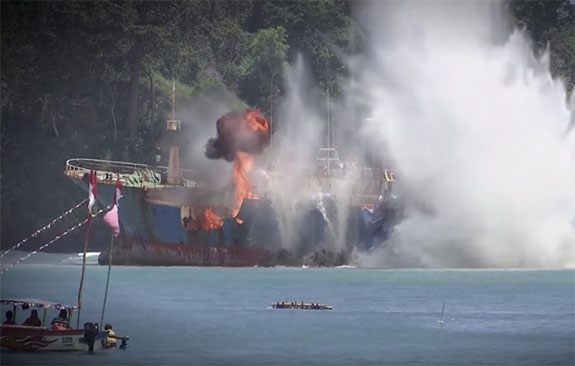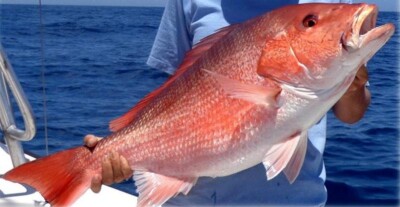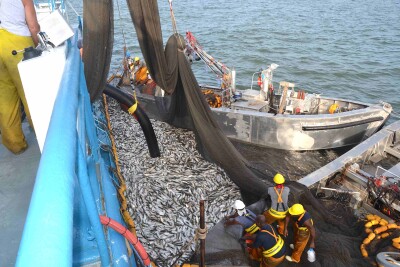(Bloomberg) -- Indonesia’s crackdown on illegal fishing — with the public spectacle of seized boats blown to smithereens — may have sparked tensions with China, but the country’s fisheries minister says it has led to a significant drop in overfishing.
Indonesian authorities set a controlled explosion to sink the fishing vessel Viking in March 2016. YouTube screenshot.
The rejuvenation of fishing stocks will help Indonesia’s economy as other growth drivers falter, Maritime Affairs and Fisheries Minister Susi Pudjiastuti said Thursday in an interview in Washington, DC. Growth is under pressure and set to be closer to the lower end of the central bank’s 4.9 percent to 5.3 percent target this year.
“Mining is going down, everything is going down, fisheries is the only one growing,” Pudjiastuti said.
Her role sees her defending an industry that along with farming and forestry makes up 14 percent of the economy of the world’s largest archipelago, and employs millions of Indonesians. The decline in fish stocks in north Asia has seen boats push into the territorial waters of Southeast Asian nations like Indonesia, often shadowed by their home country’s armed coast guards, which raises the potential for clashes at sea.
Pudjiastuti, 51, has been in cabinet since October 2014 and is popular with the public for her tough stance. Since the end of that year, Indonesia has destroyed 220 foreign boats. It has also faced increased Chinese claims that waters surrounding the gas-rich Natuna Islands are part of traditional Chinese fishing grounds.
“We catch them and we sink them,” Pudjiastuti said of the boats. “That’s the new rule, the national consensus.”
“If you fish in my EEZ, that’s illegal fishing,” she said, referring to Indonesia’s 200-nautical-mile exclusive economic zone. “If that fish is in my EEZ, that’s mine. If that fish swims past the EEZ, that’s anybody’s.”
The crackdown could see fishing stocks back to normal in two to three years, she said. With fewer foreign boats entering Indonesian waters, the country’s catch has recovered to 6.6 million tons from a low of 2.5 million tons and could be sustainable at 9.9 million tons next year. "If this reform is dropped again that growth will be gone."
A businesswoman, Pudjiastuti founded a small airline and a seafood export company. She never completed high school and calls herself the minister with the “lowest educational background.” She has previously declared that only Indonesians "can catch fish in Indonesia.”
Pudjiastuti moved to play down a spike this year in public tensions with China, saying Indonesia had not recently spotted China’s coast guard in the Natuna area. Still, China’s coast guard is prowling in the nearby South China Sea, a key trading waterway criss-crossed by claims from nations including China, Vietnam, the Philippines and Malaysia.
Indonesia is not a claimant to the South China Sea and has sought for years to keep any maritime tensions behind closed doors, but China’s assertions to territory via some maps have drifted into the Natuna area, raising the potential for dispute. The country is seeking to station more fighter jets in the Natunas and President Joko Widodo recently held a cabinet meeting on a naval ship there.
‘Very Close’
While Beijing has been annoyed by the capture of its fishing boats, “I don’t think there is any problem with the relationship,” Pudjiastuti said. “On the whole, Indonesia is very close to China, other than the fishing problem.”
One captured Chinese fishing vessel carried a map showing the Natunas as part of that country’s traditional fishing area, “which we don’t recognize,” she said. “That’s what I said to the embassy people, I said we don’t recognize that, and they said we have no dispute with that.”
In March a Chinese coast guard vessel collided with a Chinese fishing boat suspected of illegal fishing as it was being towed by Indonesian authorities, setting off terse public exchanges between the countries. In June, Indonesia’s navy detained a Chinese vessel off the Natunas and arrested seven fishermen.
China’s foreign ministry said at the time the country had no sovereignty dispute with Indonesia, “yet the two countries have overlapping claims for maritime rights and interests over some part of the South China Sea.”
Rear Admiral A. Taufiq R., commander of Indonesia’s Western Fleet, said in June that more Chinese fishing boats had been detected near the islands this year. “We need to resolve this issue. If not, they will make a one-sided claim to the waters," he said.
The government in Jakarta walks a fine line between insisting on Indonesia’s territorial integrity and acknowledging it relies on money from China to fund infrastructure and boost growth. China overtook the U.S., Singapore and Japan in the past decade to become Indonesia’s largest trading partner with $49.2 billion in transactions last year, up from $16.3 billion in 2006.
Soon after she took the post, Pudjiastuti called in ambassadors from key neighbors and warned Indonesia would blow up their boats. “They all agreed that illegal fishing is a global enemy.” Now, ambassadors sometimes apologize to her when they learn their country’s boats are straying into Indonesian waters.
Many of the boats now being caught are from Vietnam, Pudjiastuti said. The government in Vietnam understands Indonesia needs to be tough, she added, and the countries have an agreement where captured fishermen are taken to a border area and dropped off.
Still, the fight against illegal fishing remains. The likes of China, South Korea and Taiwan have vessels fishing all over the world. Some of them have many flags -- Pudjiastuti said one captured boat had 32.
"The bad guys never come into a port,” she said, arguing for the need to stay aggressive on the high seas. “Illegal fishing is all offshore."
And Indonesia has its own culprits, she added. Of the 400,000-500,000 Indonesians at sea outside the country’s waters, half are not registered or otherwise unknown.
Bloomberg News by Nick Wadhams and Bill Faries







